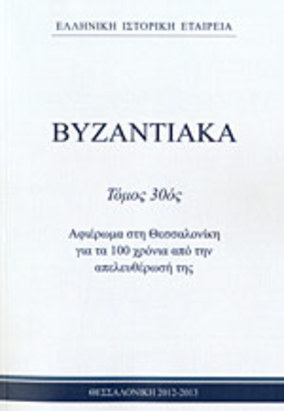Abusing Theodora : sexual and political discourse in Procopius
Part of : Βυζαντιακά ; No.30, 2012, pages 307-319
Issue:
Pages:
307-319
Section Title:
Αφιέρωμα στη Θεσσαλονίκη για τα 100 χρόνια από την απελευθέρωσή της. Ποικίλες συνεργασίες
Author:
Abstract:
The violent attack against Justinian and Theodora in Procopius’ Anecdota, especially his vivid description of Theodora’s sexual perversions and desires, have shocked and puzzled many of his readers. Not only, we can presume, his contemporaries, but also modern commentators. This shock perhaps is responsible for the often moralising reading of the relevant passages – as well as a whole series of 19th century novels set in front of a background of Byzantine sexual depravity. This paper is going to argue that despite the overtly sexual accusations laid against Theodora by Procopius, the relevant passages, especially in chapter 9 of the Anecdota, should perhaps rather be read as examples of traditional Roman political invective. Procopius is not so much attacking an immoral woman, but rather uses classical narrative elements habitually employed to denigrate politically powerful Roman men. Procopius is not railing against the inappropriate behaviour of an augusta – and where in fact would he find appropriate archetypes? – but really treats Theodora as an augustus to whom well established negative stereotypes can be applied.The argument of Theodora as an inappropriate emperor rather than an inappropriate empress can be pursued along two distinct but related lines. On the one hand we can argue that Theodora submitting to anal penetration puts her into a tradition of Roman politicians and emperors accused of owing their future positions of pre-eminence to the non-virile submission to powerful patrons – Caesar being only one illustrious example for this type of political invective. Indeed, precisely because the submission to anal penetration is effeminate, the charge would lose much of its power if it were applied to Theodora as a woman.Theodora’s lack of moderation in her sexual desires can be read on precisely the same lines. If Procopius were treating Theodora as a woman, the accusation of a lack of control over her desires would not be particularly damning. Women, according to classical conception, are unable to control their desires precisely because they are women. The immoderation of men on the other hand, also but not exclusively sexual, shows them as barbarians who, unlike Roman men, are too weak-willed to exercise control over their passions and desires. Theodora as a sexually immoderate and sodomised woman would be merely a typical woman, the power and relevance of Procopius’ accusations become apparent only if Theodora is treated as an emperor to whom traditional stereotypes of political invective can be applied.
Subject:
Subject (LC):
Notes:
Περιέχει σημειώσεις




